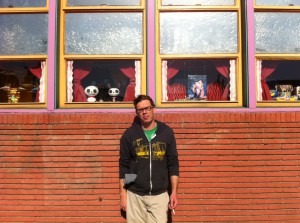When I was twelve my dad stole payload from auger mines a county north of where we lived. Mom had fallen off a truss bridge drunk the summer prior and no thing, small or large, would bring her back. So my dad took to driving, to battle the sadness, but gas costs good money and to support his habit he began filching coal. His main problem was there aren’t many places to sell coal back to, accept for other coal plants. Early morning he’d wait near the tall link gates of the companies he knew of, the back of his pickup weighted down so heavy it looked like it might snap. He was brain-soft from the loss of his wife and best friend, and the foremen and plant managers and rig drivers would laugh at him while he stood there, his flask soot-covered and true tarnished in his flat, big hand.
No one ever bought the coal but his story got around. We bred hounds to make ends meet and our house was covered in red dirt that their paws tracked in. We spoke of the normal things a father and son can without a mother to run translation. On weekends Dad would drink heavy and we would line dance in our living room, a station from Lexington reaching our transistor. Behind the house the coal pile widened. Dad kept it under a green tarp next to the kennel, the plastic weighed down with rail pins. The parents of a boy from school won small at state lotto and soon after bought a cable dish for their television. This family would invite me over and we’d watch, in full color, all the things that got beamed in.
The dogs grew and got sold or had new dogs. The first weekend of springtime the two men broke in. They’d fed the hounds pills past midnight and returned before dawn and killed them. They explained this to me and my father while they tied us with wire to chairs. I was scared and thought about my mother and some of the shows that I’d seen on television. One of the men took my dad’s socks off and pulled his big toes back and broke them. I knew this was happening on account of the coal, though the men never said so. Outside the winds snapped the tarp.
When light broke the two men untied me. I don’t remember what either of them looked like, aside that they looked like men. Both of them had guns and chrome on their belt buckles. The taller man ejected the clip on his gun and handed the weapon to me. My father was passed out where he sat.
You’re gonna hit him until he gets awake and then you’re going to hit him back to sleep again, said the man who handed the gun to me. If you don’t, I’ll put the clip back in.
I was barefoot and could feel the red dirt between my toes. I took the gun by its barrel and hit my dad across the face with it. He woke up and tried to move his arms against the wire and almost tipped the chair over. I was crying. I kept hitting at him. My eyes were closed and I could hear the metal on his face and head. He made sounds but never told me to stop what I was doing. I went at it like that until one of the men grabbed my shoulders and took back the gun. Their pickup had a Virginia plate with a “T” and a “2” in it. I told this to police on the phone when they’d gone.
I live in North Dakota now, some miles west of Bismarck. I never married and do not want to. A wife will lead to children, and I've seen what they’re capable of.
Charles McLeod's fiction has appeared in publications and on sites including Alaska Quarterly Review, Conjunctions, DOSSIER, Five Chapters, The Gettysburg Review, The Iowa Review, Michigan Quarterly Review, Midwestern Gothic, Post Road, the Pushcart Prize series, Third Coast and Salon, and is forthcoming in the anthologies New Writing from the Midwest and W.W. Norton's Fakes. His first novel, American Weather, is out now from Random House UK/Harvill Secker. His first collection, National Treasures, is out from Vintage UK this August.






